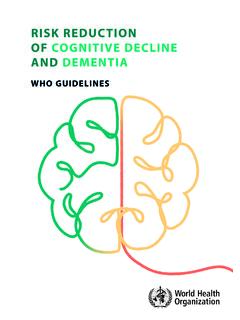Transcription of Heavy Burden of Obesity: The Economics of Prevention
1 Heavy Burden of obesity : The Economics of PreventionA quick guide for policy makersIn a Nutshell | OECD Mental Health Performance Framework22 ContactMichele Cecchini Lead Economist for Public Health, Health Division, OECD + This document, as well as any data and map included herein, are without prejudice to the status of or sovereignty over any territory, to the delimitation of international frontiers and boundaries and to the name of any territory, city or area. This publication has been produced with the financial and substantive assistance of the European Commission. The contents of this report are the sole responsibility of the OECD and can in no way be taken to reflect the views of the European opinions expressed and arguments employed herein do not necessarily reflect the official views of the OECD member countries or EU member states. Note by Turkey: The information in this document with reference to Cyprus relates to the southern part of the Island.
2 There is no single authority representing both Turkish and Greek Cypriot people on the Island. Turkey recognises the Turkish Republic of Northern Cyprus (TRNC). Until a lasting and equitable solution is found within the context of the United Nations, Turkey shall preserve its position concerning the Cyprus issue . Note by all the European Union Member States of the OECD and the European Union: The Republic of Cyprus is recognised by all members of the United Nations with the exception of Turkey. The information in this document relates to the area under the effective control of the Government of the Republic of on the data for Israel:The statistical data for Israel are supplied by and under the responsibility of the relevant Israeli authorities. The use of such data by the OECD is without prejudice to the status of the Golan Heights, East Jerusalem and Israeli settlements in the West Bank under the terms of international creditsCover image adapted from Sira Substance: Sabine Vuik, Yevgeniy Goryakin, Marion Devaux, Christina Xiao, Ali nor Lerouge, Alexandra Aldea, Francesca Colombo and Michele and editorial support: Liv Gudmundson, Lukasz Lech and Alastair Wood OECD 2019 Brochure OECD 2019 33 Overweight and its associated chronic diseases have a negative impact on societies and the economy.
3 >Overweight and its associated chronic diseases such as diabetes, cardiovascular diseases, and cancer reduce life expectancy in OECD countries by years on average. > of the health budget of OECD countries will be spent to treat the consequences of overweight over the next thirty years. >Overweight also negatively impacts educational outcomes, as children with a healthy weight are 13% more likely to report good performance in schools. >Overweight reduces employment and workers productivity. The impact can be quantified as equivalent to a reduction in the workforce of 54 million people per year across the 52 countries analysed, which include OECD, EU28, G20, OECD accession and selected partner countries. >These effects combined, overweight reduces GDP by on average in both OECD countries and EU28 member health actions to promote healthier lifestyles have a positive impact on population health and are an excellent investment for countries.
4 > Up to 76 000 cases of chronic diseases per year can be avoided across 36 OECD countries by implementing different public health interventions to provide information, increase the availability of healthy options, modify the price of health-related choices, and to regulate or restrict unhealthy choices. >For each 1 USD dollar invested in tackling overweight, up to USD will be returned in economic benefits. >Health budgets for all the 36 countries included in the study could save up to 26 USD billion, adjusted for differences in purchasing power across countries, by 2050. >Thanks to increases in employment and productivity, the total labour force can increase by an equivalent of about 134 000 full-time workers per policy brief gives an overview of the key messages from the report The Heavy Burden of the full report, please visit messagesIn a Nutshell | OECD Mental Health Performance Framework44 Overweight is growing, underpinned by unhealthy diets and lack of physical activity Overweight and related diseases reduce life expectancy by yearsSource.
5 OECD analyses on national health and time use surveys50% of people have an unhealthy diet (measured against national guidelines)40% of waking time is spent in sedentary activities ( watching tv)2 in 5 individuals do not consume a sufficient amount of fruit and vegetables1 in 3 people do not do a sufficient amount of physical activityOver the next 30 years, overweight will result in 462 million new cases of cardiovascular disease in 52 countries, and 212 million cases of diabetes among other a result, people will live on average years less due to overweight, across OECD countries. This decrease in life expectancy is the average across the total population not just for people who are a decade after the publication of the first OECD report on obesity , obesity and the Economics of Prevention Fit not Fat , overweight continues to be a pressing public health issue despite the policy responses put in place by countries: While in 2010 about one in five people in OECD countries were obese, this has now risen to nearly one in four.
6 In the vast majority of OECD member countries, more than half of the population is now overweight. In the last few years, there has also been a significant growth in morbid obesity . Poor diet, lack of physical activity and sedentary behaviour have contributed to the obesity OECD 2019 55 The impact of overweight on life expectancyThe impact on life expectancy in years, average over 2020-2050 Source: OECD, The Heavy Burden of obesity , years-5-4-3-2-10 JapanIndiaIndonesiaKoreaSouth AfricaChinaDenmarkSwitzerlandIcelandLuxe mbourgPortugalNorwayFranceNetherlandsBel giumAustriaPeruFinlandIrelandG20 averageGermanySwedenSpainUnited KingdomAustraliaCy prusItalyOECD averageGreeceIsraelEU averageColombiaNew ZealandSloveniaMaltaCanadaTurkeyArgentin aSaudi ArabiaBrazilEstoniaSlovak RepublicCosta RicaLithuaniaRomaniaCzech RepublicBulgariaCroatiaChileLatviaHungar yUnited StatesRussian FederationPolandMexicoYearsIn a Nutshell | OECD Mental Health Performance Framework66 Health expenditure associated with overweightHealthcare expenditure due to overweight per year, as a percentage of total health expenditure, average over 2020-2050% of total health expenditureImpact of overweighton GDPP ercentage difference in GDP due to overweight.
7 Average over 2020-20500%5%10%15%ESTFRAPERINDLVACOLIDN JPNLTUHUNSVNPOLHRVRUSSVKCRIROUCZEZAFKORC HECHNNZLISREU28 averageAUTGBRLUXOECD averageBGRISLAUSCHLG20 averageBRAMEXITAIRLSWEGRCDNKFINBELESPNOR ARGPRTCYPMLTCANDEUNLDTURSAUUSA% of total health expenditureSource: OECD, The Heavy Burden of obesity , 2019-6%-5%-4%-3%-2%-1%0%JPNLUXISLKORCHEA UTINDNLDFRACHNISRITABELDNKNORFINESPPRTDE UGRCSWESVNAUSNZLIRLIDNOECD averageEU23 averageGBRG20 averageCRICANZAFCHLESTCZEARGHUNSVKRUSPOL COLLTUUSASAUTURLVABRAMEX% differencein OECD 2019 77 Overweight impacts health budgets substantiallyObesity damages educational outcomes, labour force productivity and the economyPeople who are overweight require healthcare services more often and for more complicated issues. This raises health expenditure by 209 USD per capita across the OECD. On average, OECD countries will spend of their entire healthcare budget on treating the consequences of overweight over the next thirty to children with a healthy weight , children who are overweight have poorer school performances.
8 When children with overweight grow up, they show lower school attainment and a lower likelihood of completing higher education. >On average, boys and girls with a healthy weight are 13% more likely to report good school performance, compared to their peers with obesity . >Girls who are obese are three times more likely to be bullied than their peers with a healthy weight , compared to time for boys. >In the United States, boys and girls aged 12-19 who are obese are three percentage points more likely to miss school compared to adolescents with a healthy also has a considerable impact on the broader economy as it reduces labour force productivity and human capital. Individuals with chronic diseases are more likely to be unemployed and to miss days of work. When they are at work, they may also be less productive than healthy individuals. Across the 52 countries included in this analysis, overweight effectively reduces the workforce by about 54 million people per year: >28 million full-time equivalent due to reduced employment.
9 >18 million full-time equivalent due to reduced productivity when at work (presenteeism). >8 million to absenteeism. The macro-level effect is that overweight reduces GDP by on average in both OECD countries and EU28 member states. To cover the increased fiscal pressure caused by overweight, individuals effectively pay a tax of 359 USD purchasing power parity (PPP) per capita per year in OECD obesity epidemic places a Heavy Burden on individuals, society and the economy. Over half the population in OECD countries is overweight, with nearly 1 in 4 people considered obese. In the next 30 years, this will cause 220 million cases of non-communicable diseases (NCDs) in OECD countries. These NCDs will reduce life expectancy in OECD countries by years across the population; and their treatment will account for of all health expenditure. Overweight disadvantages children, as boys and girls with a healthy weight are 13% more likely to report good school performance.
10 In adults, overweight lowers labour market outputs, effectively reducing the workforce by the equivalent of 18 million full-time workers in OECD countries. Overall, overweight reduces the gross domestic product (GDP) by To cover the cost of overweight, every person effectively pays 359 USD per year in taxes due to Heavy Burden of obesity The Big Picture for the OECDO verweight disadvantages children, as boys and girls with a health weight are 13% more likely to report good school the next 30 years, this will cause 220 million cases of non-communicable diseases (NCDs) in OECD half the population in OECD countries is overweight, with nearly 1 in 4 people considered Heavy Burden of obesity The Big Picture for the OECD lowers labour market outputs, effectively million full-time workersdomestic product (GDP) To cover the societal cost person effectively pays additional taxes due to in OECDin OECD countriesin their treatment will account for of all health spendingThese NCDs will reduce life expectancy in OECD countries by years accross the populationcountriesIn a Nutshell | OECD Mental Health Performance Framework1010 Countries have implemented policies to tackle obesity , but gaps remainObesity policies in 52 countriesCountries have made substantial progress implementing policies to tackle unhealthy diet and lack of physical activity in the last decade.
















